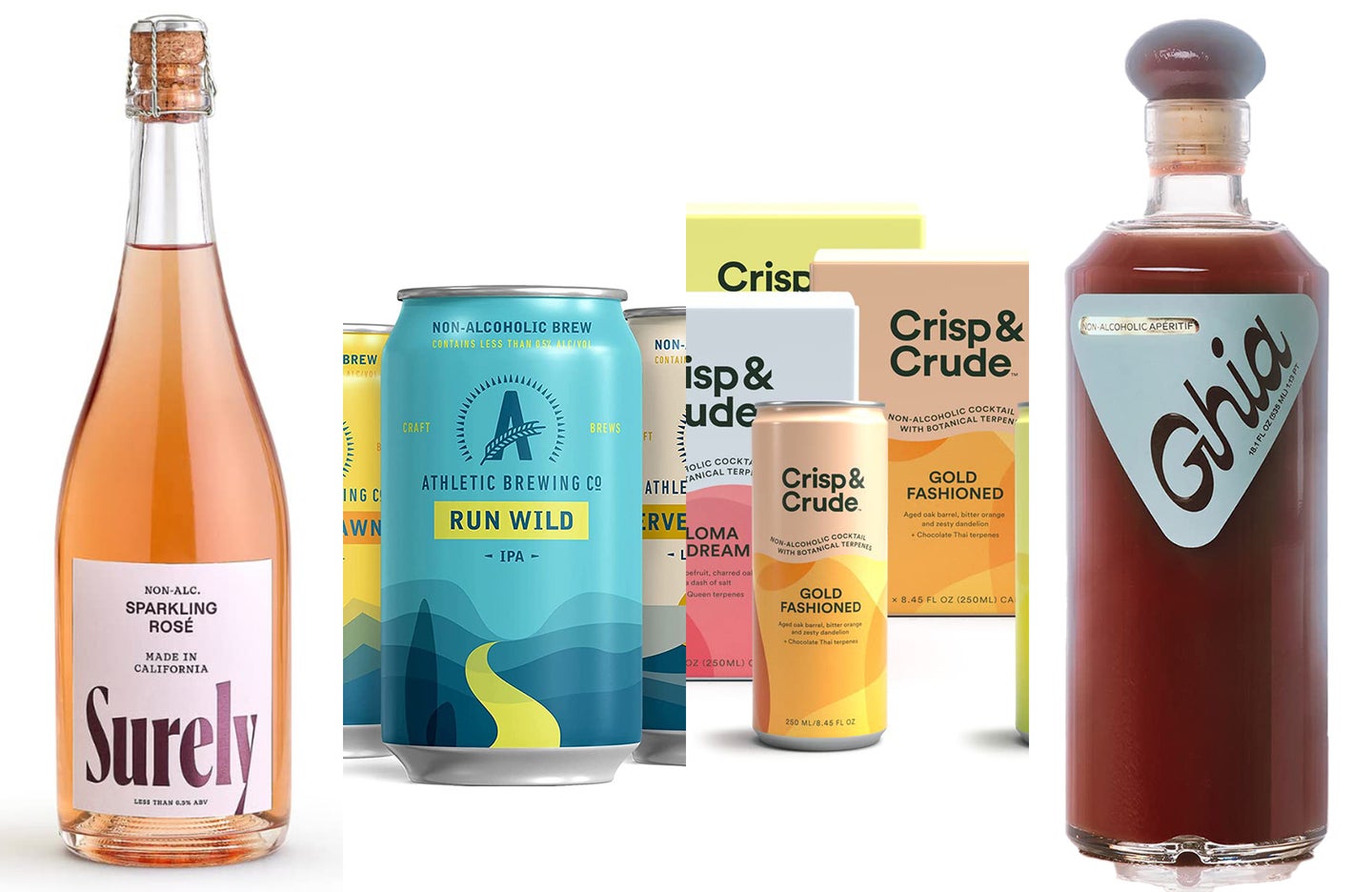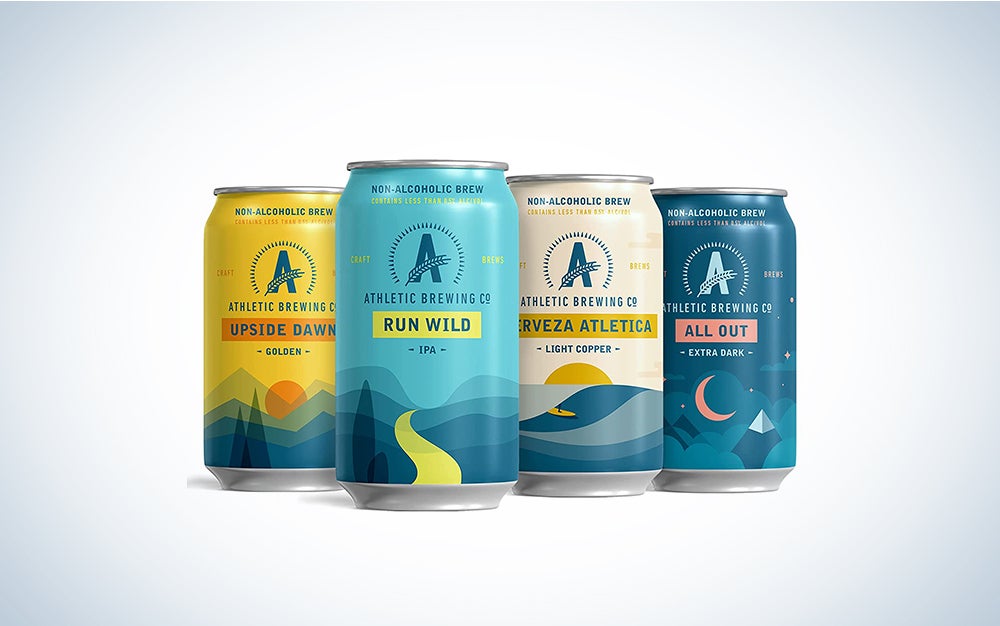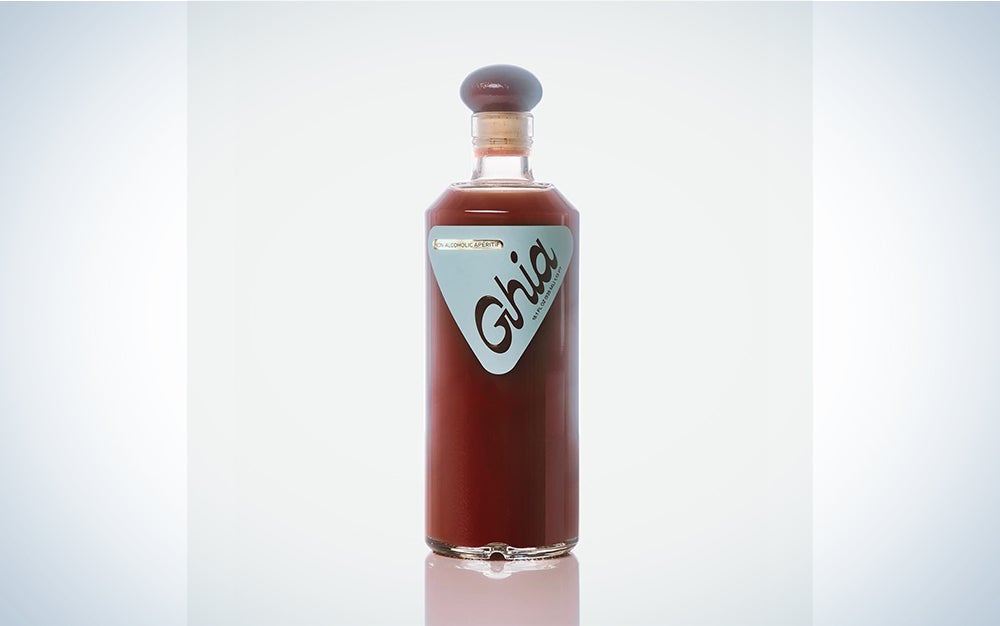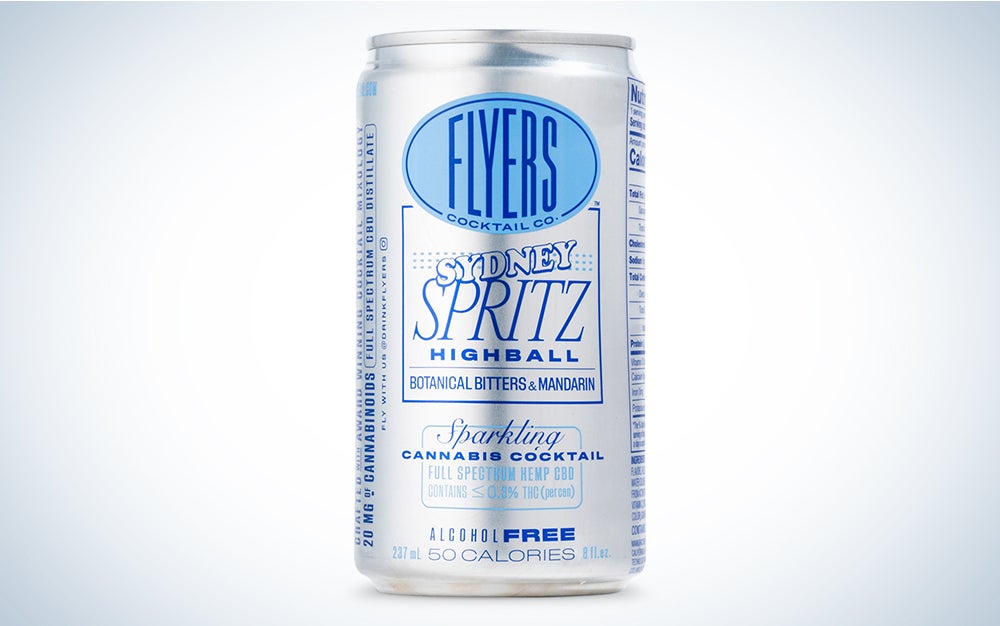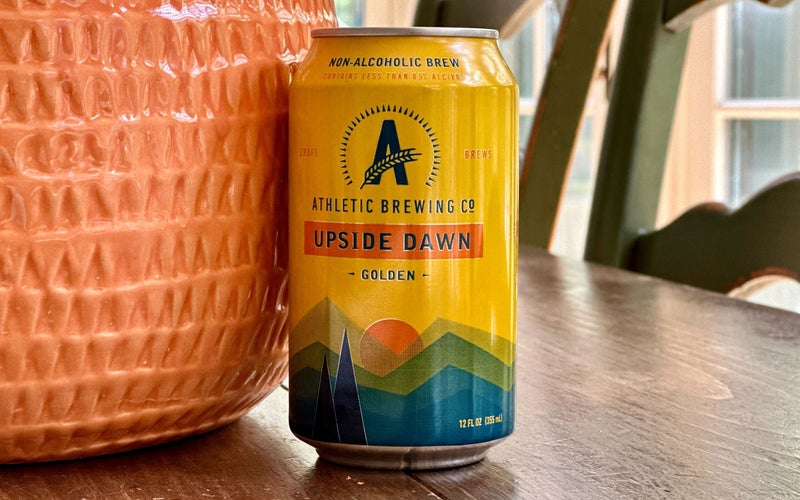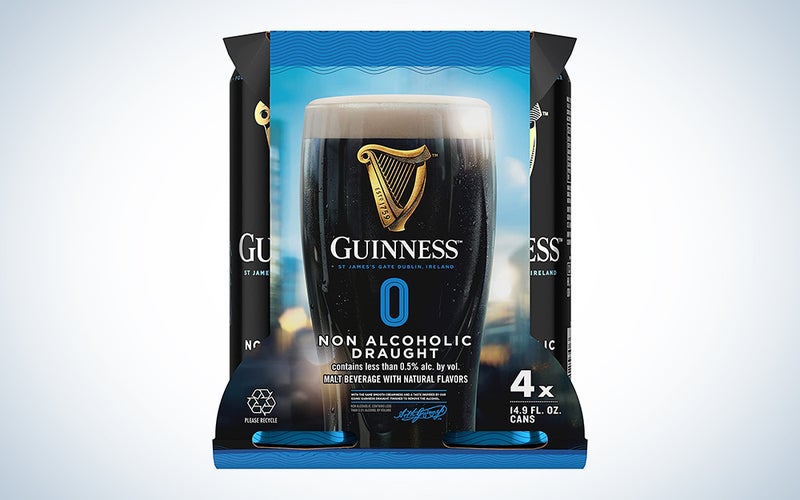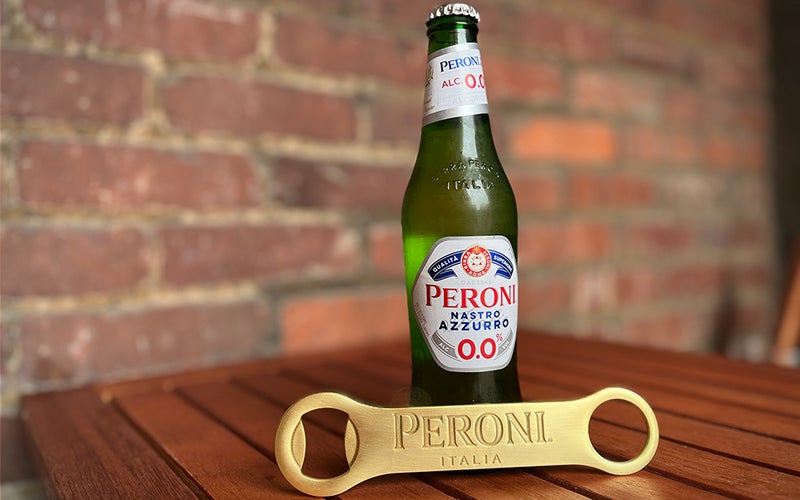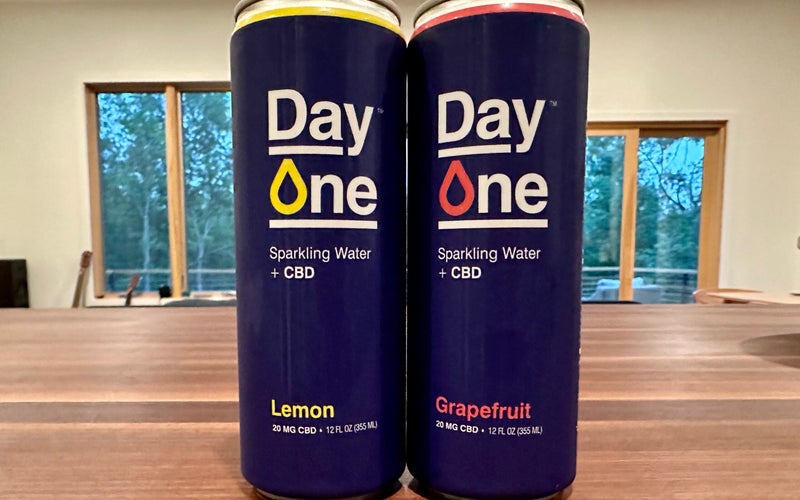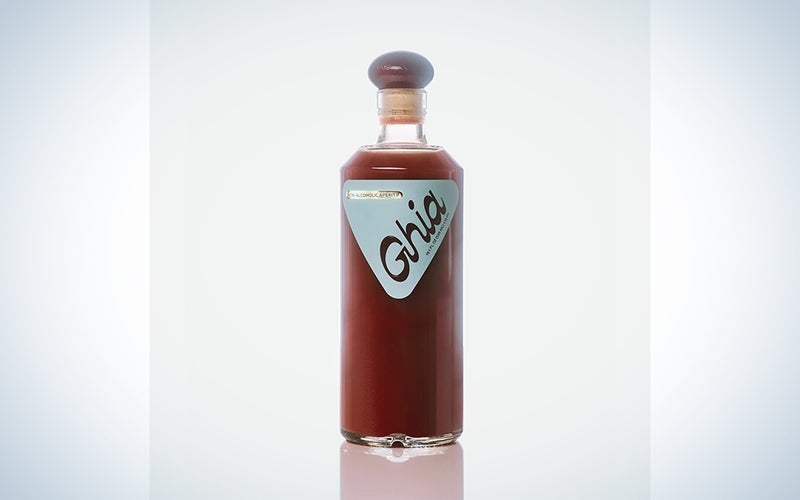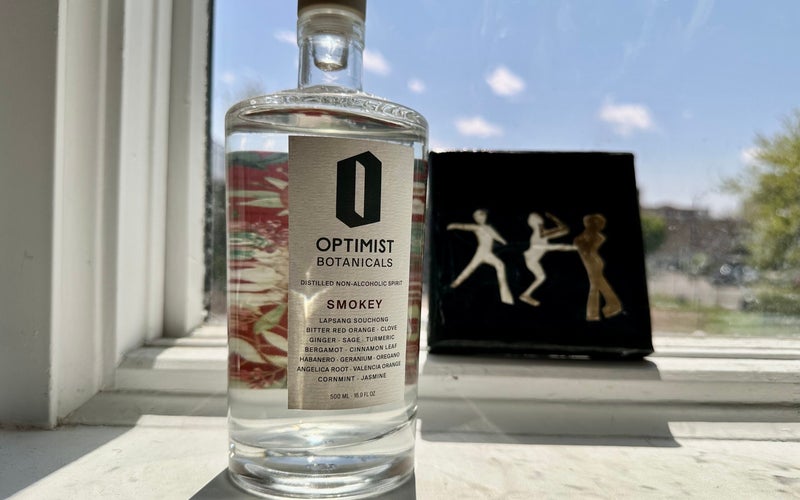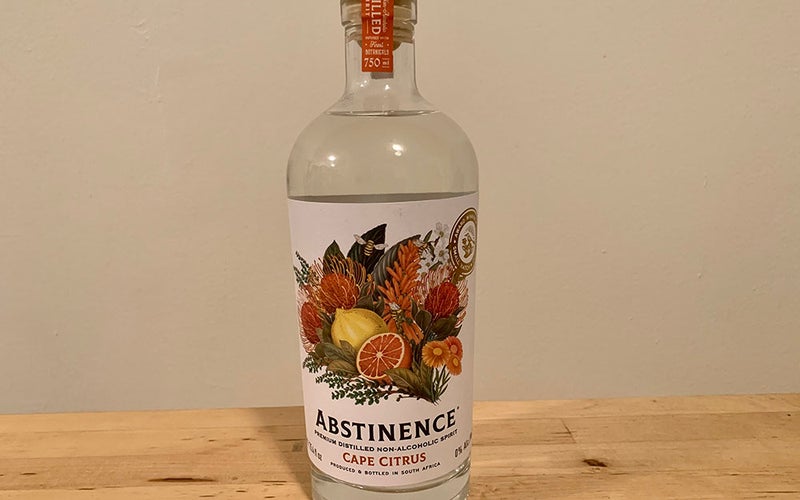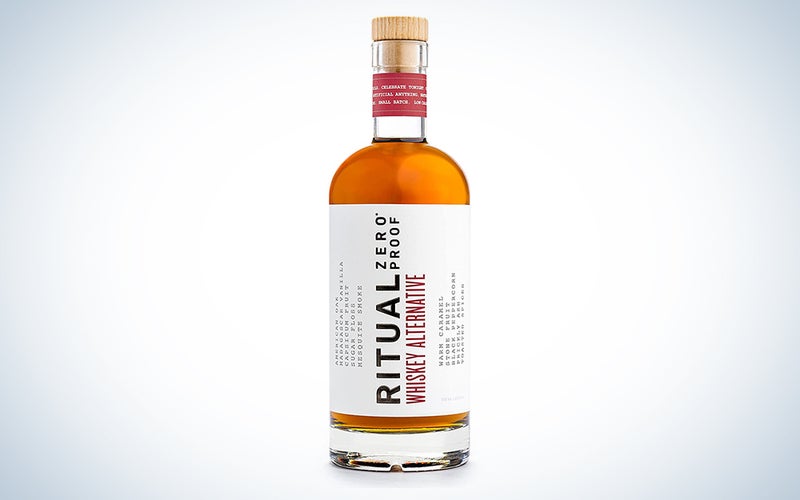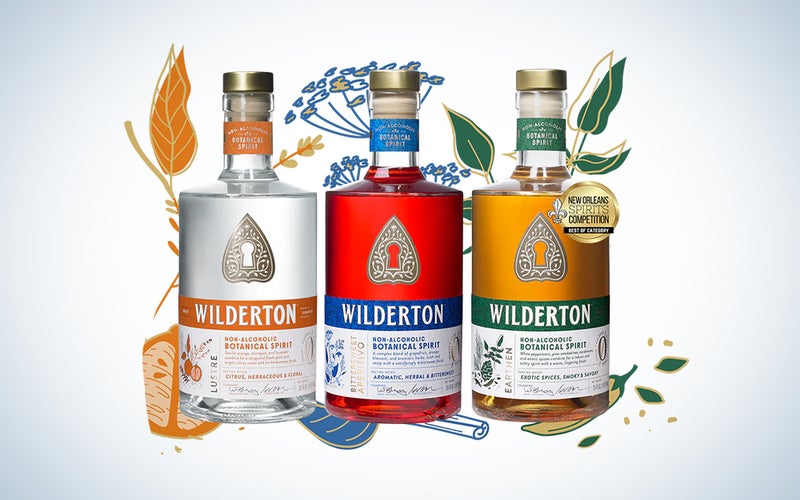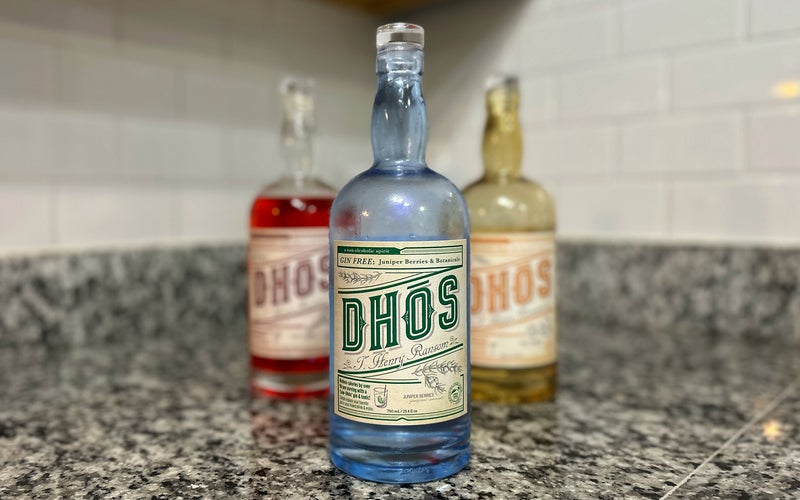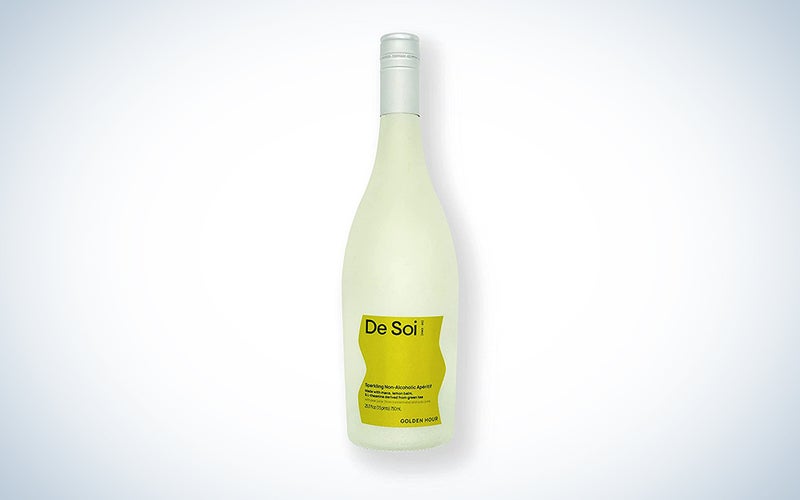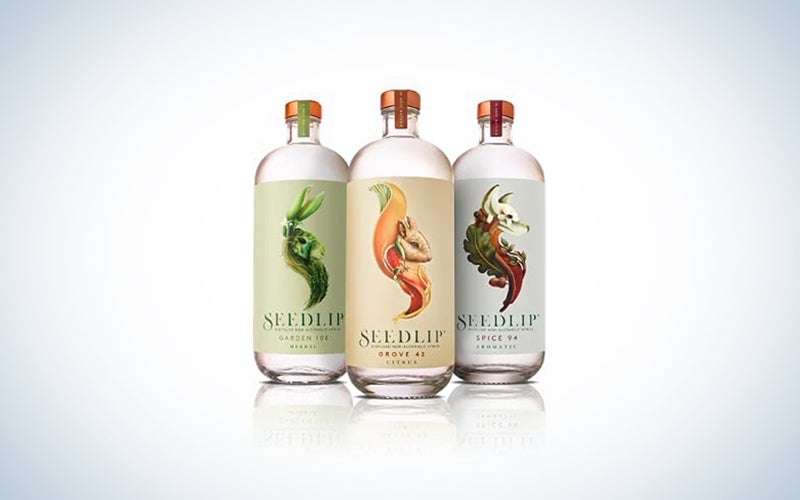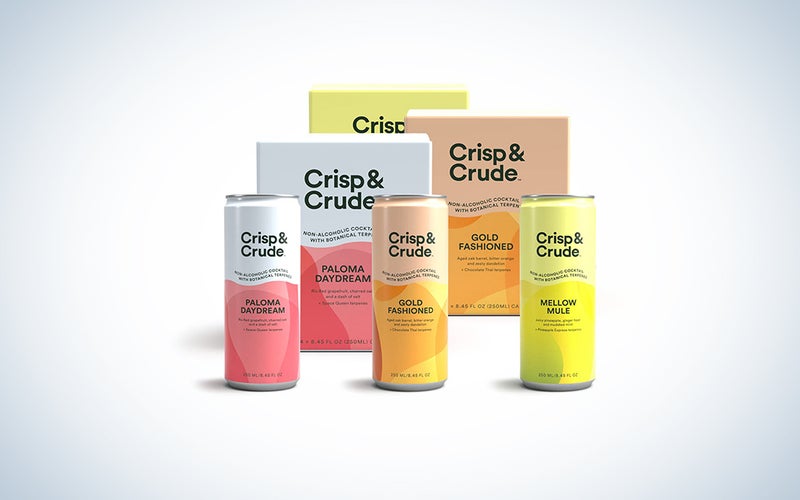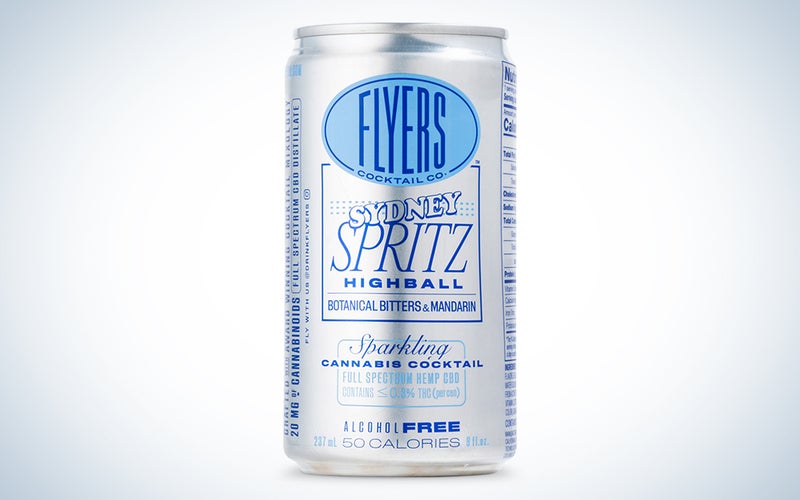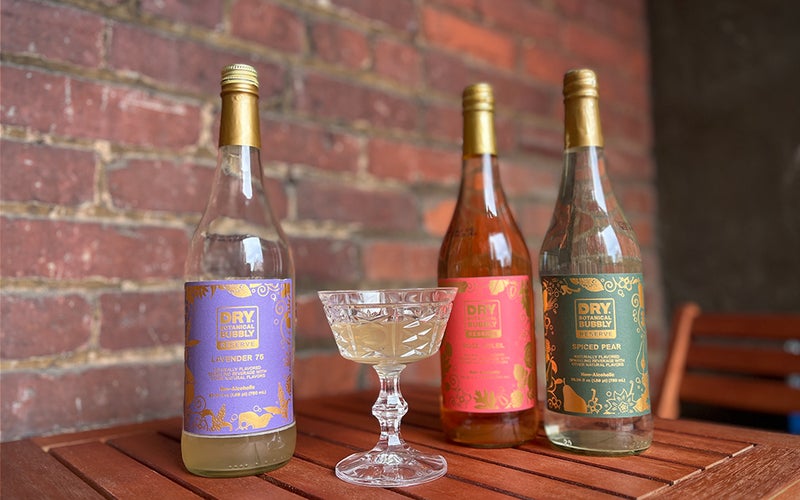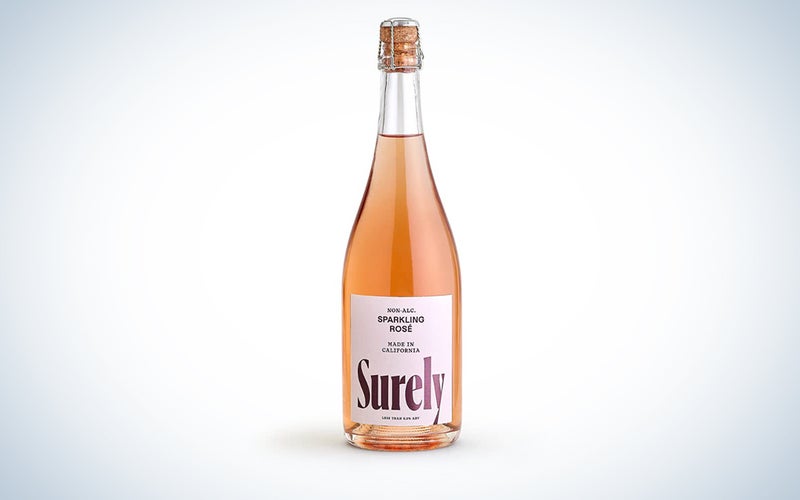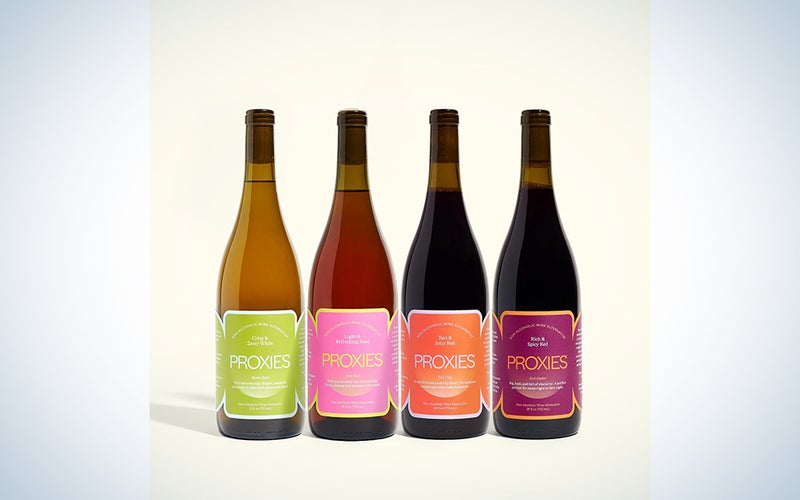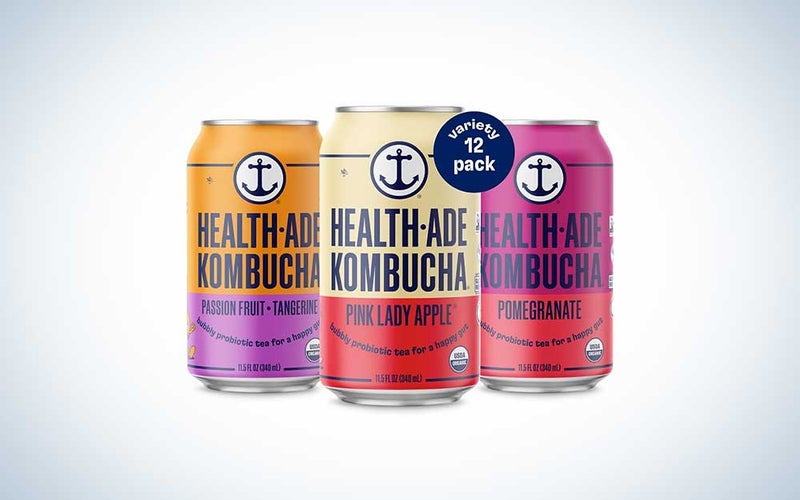We may earn revenue from the products available on this page and participate in affiliate programs. Learn more ›
Between bottles at family dinner(s) or popping Champagne at New Year’s, it’s hard for someone looking for a little non-alcoholic fun to kick off a year of healthier habits. “Liquid courage” and social lubricant, alcohol tends to be everyone’s favorite coping mechanism during the holiday season and gatherings in general, whether when first introduced to the extended family, dealing with distant relatives you’d rather remain removed, or being surrounded by friends of friends. Hence, the growing popularity of Dry January and the opportunity to learn that there are better, healthier ways to cope. Moderation can improve your mental health, lower blood pressure, and, best of all, prevent a dreaded hangover and related hang-xiety … and maybe an argument or two with strangers. Instead of snagging another lazy, hazy IPA out of the fridge, consider an NA beer or alternative spirit. Even better, the best non-alcoholic drinks are proof of the deliciousness of zero-proof that can be enjoyed as new year’s recompense transitions into sober spring and beyond.
Note: If you have moderate to severe alcohol use disorder, please see a healthcare provider before withdrawing, as it can be quite dangerous to detox at home by yourself.
- Best NA beer sampler: Athletic Brewing Co. Craft Non-Alcoholic Beer
- Best NA stout: Guinness Non-Alcoholic Draught Beer
- Best NA import beer: Peroni Nastro Azzurro 0.0
- Best with CBD: Day One Sparkling Water
- Best aperitif: Ghia
- Best tequila alternative: Optimist Botanicals Smokey
- Best gin alternative: Abstinence Spirits Cape Citrus
- Best whiskey alternative: Ritual
- Best botanical spirit: Wilderton Botanical Spirit
- Best value: Dhōs
- Best celeb-made non-alcoholic botanical beverage: De Soi
- Best bundle: Seedslip
- Best mood lifter: Crisp & Crude
- Best canned alternative cocktails: Flyers Cocktails
- Best bottled mocktails: DRY Botanical Bubbly Reserve
- Best NA wine: Surely Non-Alcoholic Sparkling Rose
- Best wine alternative: Proxies
- Best kombucha: Health-Ade Canned Kombucha
How we chose the best non-alcoholic drinks
I had my own Dry January journey in 2021, after years of problematic college drinking habits and at-home COVID-19 happy hours. I ended up extending it until the middle of February. Instead of a month of regrets and voicing my displeasure of imposing a personal Prohibition—like some other “low to no” participants—I realized, simply put, that alcohol can be bad and getting drunk is dumb. Now, I am a self-proclaimed “beverage girlie” and lead a damp lifestyle: I don’t keep alcohol in my home but will enjoy a beer after improv. I also won’t shut up about how moderation is great. My partner doesn’t drink at all, so we’re always on the hunt for a bubbly, crisp, cold NA bev to sip on during dinners or concerts.
I’ve also reported on beverages in the past for Gear Patrol and have a fridge stocked with Diet Coke, Limoncello La Croix (the best flavor, fight me), and my favorite NA beers. We also consulted Dry Atlas, a non-alc database, for picks.
The best non-alcoholic beverages: Reviews & Recommendations
Going for an NA beer or alternative spirit is just like a vegetarian or vegan going for a meatless chik’n patty or Impossible Burger: you’re simply enjoying a just-as-tasty substitute for something you don’t want to ingest for personal or health reasons. One of these will level up your seltzer or become your innocuous favorite to enjoy while eating takeout and watching Love Island.
Best NA beer sampler: Athletic Brewing NA beer
Why it made the cut: This NA beer tastes as nuanced as its boozy counterpart without post-six-pack regrets.
Specs
- Milliliters: 12 fluid ounces (or 355 ml) per can
- Spirit, beer, or wine: Beer
- Alcohol removed or zero alcohol: Alcohol removed
- Enhancements: N/A
Pros
- Tasty
- Gluten-free
- Made of clean and natural ingredients
Cons
- Might not be able to be consumed if you’re pregnant
If a fresh, cold one is more your style, Athletic Brewing has your back with its NA brews. They don’t have a bready aftertaste like other NAs; in fact, they are some of the best-tasting NAs you can buy, with the company racking up plenty of awards over the years. This 24-pack can fill the fridge so everyone can crack open one outside without the mood threatening to be cracked when too many full-strength brews make tongues loose.
Best NA stout: Guinness Non-Alcoholic Draught Beer
Guinness
Why it made the cut: An Irish classic gets a non-boozy touch without sacrificing quality.
Specs
- Milliliters: 14.9 millimeters per can
- Spirit, beer, or wine: Beer
- Alcohol removed or zero alcohol: Alcohol removed
- Enhancements: N/A
Pros
- Guinness taste without the alcohol
- Pours like a real Guinness
- Tasty
Cons
- Heavy beer
- Might scare some who are sober because of the realistic taste
NA beer can sometimes taste like carbonated bread instead of a bodied, complete fizzy beverage. That is not the case with Guinness Non-Alcoholic Draught Beer, which tastes like its malty cousin. If you’re sober and in recovery, the realistic taste of NA Guinness might make you feel like you’ve seen an ex walk into a room—ignore this one if that would make you uncomfortable, which is what you would also do when seeing your ex walk into a room. This tasty, dark beverage is a reliable choice (unlike your ex!) if you’re looking for a stout without stout regrets.
Best NA import beer: Peroni Nastro Azzurro 0.0
Amanda Reed
Why it made the cut: Evoke the Amalfi Coast with a light Italian lager that’s refreshing and full-bodied.
Specs
- Milliliters: 330 ml
- Spirit, beer, or wine: Beer
- Alcohol removed or zero alcohol: Alcohol removed
- Enhancements: N/A
Pros
- Light and refreshing
- Full-bodied
- Tasty
Cons
- Potentially too-close to comfort beer taste
Sometimes you need a light international beer akin to a Stella or a Heineken. We’re personal fans of Peroni, a light Italian lager that screams “warm summer breeze and riding a Vespa.” However, maybe you’re the person driving the Vespa and can’t imbibe a lovely Peroni? Enter Peroni Nastro Azzurro 0.0, which, for an NA lager, is incredibly full-bodied (read: not watery). It tastes like its Peroni Nastro Azzurro boozy cousin, which might cause you to do a double-take at the label, but for those hoping to hop on a Vespa or behind the wheel of a Fiat, the Nastro Azzurro 0.0 is a solid choice.
Best with CBD: Day One Sparkling Water
Billy Cadden
Why it made the cut: This refreshing, no-cal beverage is infused with CBD to promote relaxation.
Specs
- Milliliters: 12 fluid ounces (355 milliliters)
- Spirit, beer, or wine: Canned sparkling water
- Alcohol removed or zero alcohol: Zero alcohol
- Enhancements: CBD
Pros
- Infused with 20 milligrams of CBD
- Comes in grapefruit, lemon, and lime flavors
- Zero calories
- Made with natural ingredients
Cons
- Pricey for sparkling water
Looking for a pick-me-up that doesn’t pack any calories? Consider Day One Sparkling Water. This canned beverage is infused with 20 milligrams of CBD, also known as cannabidiol, a chemical found in the Cannabis sativa plant known for its ability to promote relaxation without getting you high. Day One’s sparkling water is available in grapefruit, lemon, and lime flavors and doesn’t have any sugar or calories.
Best non-alcoholic aperitif: Ghia
Ghia
Why it made the cut: This twist on a traditional aperitif is tasty and can be consumed on its own or mixed.
Specs
- Milliliters: 500 ml
- Spirit, beer, or wine: Aperitif
- Alcohol removed or zero alcohol: Zero alcohol
- Enhancements: Some adaptogens (lemon balm; rosemary)
Pros
- Tasty
- Versatile
- Makes you feel sophisticated and fancy
Cons
- Small bottle compared to others on this list
Inspired by Mediterranean aperitivo culture—think Campari and Amaro over finger food before 9 p.m. dinner in a bustling Milanese café—Ghia is light, dry, and the right amount of bitter. Drink it on its own or combine it with a mixer of your choosing for a spritz or cocktail. If a bottle seems like too much of a commitment, check out Ghia’s transportable cans that add lime, salt, and ginger to the OG Ghia aperitif.
If you’re already a Ghia fan and looking for something in the same vein, try Figlia—both have similar ingredients (white grape juice, rosemary extract, and elderflower, for example), but we love this NA aperitif’s earthiness thanks to clove and chamomile extract. Figlia, like Ghia, also sells spritz-in-a-can for on-the-go sips.
Best tequila alternative: Optimist Botanicals Smokey
Billy Cadden
Why it made the cut: A mezcal-like sipper that is smokey and makes for a perfect mocktail margarita.
Specs
- Milliliters: 500 ml
- Spirit, beer, or wine: Spirit
- Alcohol removed or zero alcohol: Zero alcohol
- Enhancements: N/A
Pros
- Designed to use mixed like a premium spirit
- Lots of body
- Spicy
Cons
- Not that many fluid ounces compared to others on this list
This botanical spirit has woody, floral, and bitter notes, and is designed to be mixed like a premium spirit. This one specifically drinks like smooth tequila or mezcal. Mix it with your favorite ginger ale and garnish with a jalapeno slice or an orange peel for a scrumptious sipper sans alcohol. However, each bottle is only 16.9 fluid ounces, meaning you’ll have to be cognizant of how much you use before running out.
We also recommend Clean Co.’s CleanT—not only is it a lovely substitute in a margarita or paloma, it pairs lovely with Winderton Lustre (more on that later).
Best gin alternative: Abstinence Spirits Cape Citrus
Jen McCaffery
Why it made the cut: You’ll feel good the next day after drinking this gin alternative, thanks to its lack of alcohol and the company’s dedication to protecting the South African Cape Floral Kingdom.
Specs
- Milliliters: 750 ml
- Spirit, beer, or wine: Spirit
- Alcohol removed or zero alcohol: Zero alcohol
- Enhancements: N/A
Pros
- Proceeds go to wildlife conservation
- No artificial flavors
- Feels sophisticated
Cons
- Those looking for an exact gin dupe will be disappointed
Skipping alcohol doesn’t mean you have to skip out on delicious flavor. Abstinence Spirits Cape Citrus is inspired by South Africa’s Floral Kingdom, one of the world’s most diverse habitats. It’s infused with familiar citrus flavors, like orange, grapefruit, and grapefruit along with ginger, fennel, and pepper that give this concoction a subtle savory kick. Other notes, such as the mandarin naartjie and bucchu, are native to South Africa. And with no sugar and zero calories, you can swirl this botanical gin substitute into your seltzer as a pick-me-up any time.
Best whiskey alternative: Ritual
Ritual
Why it made the cut: Have a better boulevardier with this whiskey alternative that’s highly rated by restaurant professionals.
Specs
- Milliliters: 750 ml
- Spirit, beer, or wine: Spirit
- Alcohol or zero alcohol: Zero alcohol
- Enhancements: N/A
Pros
- Heat on the tail end—just like whiskey
- Rated highly by professionals
- Soft and round flavor profile
Cons
- Those looking for a straight whiskey dupe will be disappointed
This whiskey alternative is rated 85/100 Silver by the Beverage Testing Institute, a spirits research & review company. This makes it the highest-reviewed alcohol-free whiskey alternative. The numbers don’t lie! Vanilla and oak overtones mingle with notes of stone fruit and a little kick of heat at the end. Although it’s not meant to be sipped straight, you can use it to make an almost-NA Boulevardier or safer whiskey sour. We’re also fans of NKD LDY’s whiskey alternative, which is smoky and has the whiskey taste without the regret.
Best botanical spirit: Wilderton Botanical Spirit
Wilderton
Why it made the cut: Each flavor is unique and delicious—probably the best we’ve tasted.
Specs
- Milliliters: 750 ml.
- Spirit, beer, or wine: Spirit
- Alcohol removed or zero alcohol: Zero alcohol
- Enhancements: N/A
Pros
- Bittersweet Aperitivo a Campari dupe
- Unique in their own way
- Versatile
Cons
- Expensive
- Not a straight dupe for gin or whiskey
Wilderton’s line of botanicals is a loving homage to spirits like Campari, whiskey, and gin. In fact, their Bittersweet Aperitivo is a spot-on dupe, taste-wise, to Campari or Aperol, making it a great choice if you’d like to make your spritz even lower in ABV. Earthen—with cardamom, white peppercorn, and pine-smoked tea—is rich and spicy and even leaves a bit of heat when you’ve put down your glass and returned to the conversation. Lustre is a dreamy, citrusy blend of bitter orange peel, tarragon, lavender, and coriander that pairs great with tonic or soda water for a crisp mocktail in the garden.
Best value: Dhōs
Tony Ware
Why it made the cut: Refresh your bar with spirits that contain organic ingredients.
Specs
- Milliliters: 750 ml.
- Spirit, beer, or wine: Spirit
- Alcohol removed or zero alcohol: Zero alcohol
- Enhancements: N/A
Pros
- Less than $80 for three bottles
- Made by a well-established distillery
- The cheapest bottle on this list
Cons
- Bundle subscription includes all three flavors—a bummer if you’re looking for multiples of the same flavor
Practicing moderation doesn’t mean sacrificing pleasure; distillers don’t have to forego flavor to achieve alcohol alternatives. These are the immediate takeaways after sampling the Dhōs non-alcoholic spirit/liqueur lineup—made in a three-step process using natural pesticide-free ingredients. Cooked up at an organic farm and distillery in Sheridan, Ore.—also home to Ransom Spirits, known for reviving Old Tom Gin and making whiskeys and vermouth—the mindful mixtures come in colorful stopper-topped bottles with small batch silhouettes and make for captivating (and keto-friendly) cocktail counterparts. Gin Free is savory, herbaceous, and refreshing—redolent of juniper and lime backed by a peppery note. It’s warm and spicy upon first sip, almost gingery, but turns cool thanks to a cilantro and peppermint component. Want to transition from gin & tonic to an NA Negroni? Mix Gin Free with Bittersweet, which carries over a hint of mint threaded through a sunset-colored elixir of rhubarb, pithy pink grapefruit, flamed citrus peel, and monk fruit. Or add it to soda water for a friendlier spritz. Orange, meanwhile, presents a melange of blood orange and vanilla with a dash of cayenne and coriander. It’s a great replacement for triple sec in off-dry “margaritas” but makes for a creamy, dreamy mocktail on its own with soda water, tonic, ginger ale, and more. Offered for $10 less than competitors on average, Dhōs is a premium product without a top-shelf price tag.
Best celeb-made non-alcoholic bubbly botanical: De Soi
De Soi
Why it made the cut: Each flavor is fine, fresh, and fierce—this bubbly mocktail has it on lock.
Specs
- Milliliters: 750 ml
- Spirit, beer, or wine: Bubbly craft cocktail
- Alcohol or zero alcohol: Zero alcohol
- Enhancements: Adaptogens like reishi, ashwagandha, L-theanine
Pros
- Crisp and carbonated
- Darn tasty
- Adaptogenic for a little healthy buzz at the party
Cons
- Those who hate tart things may not enjoy these mocktails
Katy Perry is known for hits like “Teenage Dream” and “Hot N Cold,” but did you know she is also in the health and wellness biz? Not only is she an investor in apple cider vinegar giant Bragg Live Food Products, but she co-founded De Soi, an adaptogen aperitif company, in 2022. Golden Hour (shown here) is made with maca and L-theanine for relaxation and is great for making mocktail mules and a non-alcoholic spritz. Champignon Dreams is a bitter, earthy reishi and passion flower spirit for negroni or old-fashioned lovers. Purple Lune mixes ashwagandha, tart cherry, and botanicals to give the feel of a nightly glass of red. If bottles aren’t your style, De Soi also sells its three flavors in cans. All flavors have a tart bite—if that’s not your jam, stick to something sweeter.
Best bundle: Seedslip
Seedlip
Why it made the cut: A delicious bundle means you can experiment and explore, all while saving some cash.
Specs
- Milliliters: 700 ml
- Spirit, beer, or wine: Spirit
- Alcohol removed or zero alcohol: Zero alcohol
- Enhancements: N/A
Pros
- Allergy-friendly
- High-quality ingredients
- Versatile
Cons
- Expensive
If you’re looking for a bundle package, look no further than this one from Seedlip. It includes Seedlip Grove 43 (a citrusy, ginger, and lemongrass spirit), Seedlip Spice 94 (a waltz between allspice, cardamom, and grapefruit), and Seedlip Garden 108 (an herby promenade of peas, rosemary, and thyme). They are best served with ginger ale and a citrus peel garnish—perfect for breaking out the fancy glasses sans next-day guilt.
Best mood lifter: Crisp & Crude
Crisp & Crude
Why it made the cut: These keto-friendly, gluten-free mocktails are infused with terpenes and safe to drink while pregnant.
Specs
- Milliliters: 8.45 fluid ounces per can (250 milliliters)
- Spirit, beer, or wine: Canned cocktail
- Alcohol removed or zero alcohol: Zero alcohol
- Enhancements: Botanical terpenes
Pros
- Tasty
- Dietary friendly
- Pre-mixed
Cons
- Expensive
- Only available in cans
These NA craft cocktails are made with botanical terpenes extracted from plants, fruits, and roots for calmness, creativity, and relaxation. You can purchase each flavor individually, but we’re fans of the variety pack that includes four cans of its three flavors: Paloma Daydream (a salty, woody grapefruit drink with Space Queen terpenes); Gold Fashioned (bitter orange, zesty dandelion, and Chocolate Thai terpenes); and Mellow Mule (ginger, citrus, and mint with Pineapple Express terpenes). Leave the joint at home and pass around a can of this instead.
Best canned alternative cocktails: Flyers Cocktails
Flyers
Why it made the cut: These canned mocktails are inspired by bar favorites and feel just as fancy to imbibe.
Specs
- Milliliters: 237 ml or 8 fluid ounces
- Spirit, beer, or wine: Canned cocktail
- Alcohol removed or zero alcohol: Zero alcohol
- Enhancements: 20 milligrams of CBD
Pros
- Pre-mixed
- Cocktail-inspired
- Feels fancy
Cons
- Only available in cans, which are small
These sparkling, non-alcoholic drinks are made with 20 milligrams of CBD and are inspired by cocktail menu mainstays. BKLN Gold is reminiscent of an American Bourbon cocktail thanks to its oakiness, spice, and smooth vanilla. Tokyo Marg is a citrusy Yuzu sparkler with a touch of heat. Our favorite, however, is the Sydney Spritz Highball: a bold, herbaceous blend of citrus zest, mandarin orange, and bitters.
Best bottled mocktails: DRY Botanical Bubbly Reserve
Amanda Reed
Why it made the cut: A fizzy mocktail is a screwcap undoing away with DRY Botanical Bubbly Reserve.
Specs
- Milliliters: 750 ml bottle
- Spirit, beer, or wine: N/A
- Alcohol removed or zero alcohol: Zero alcohol
- Enhancements: N/A
Pros
- Tasty
- Zero-effort
- Good for those with dietary needs
Cons
- Could use some more carbonation
If you’re looking for a not-so-stiff drink after work but don’t have the brainpower to create something new, take the guesswork out of mixology with these pre-mixed mocktails from DRY. They come in three flavors: Lavender 75, a botanical boozeless take on a French 75; Rose Soleil, a Provence Rose-style beverage with touches of strawberry, rose, and oak; and Spiced Pear, which blends ripe pears with vanilla and cardamom. We also love the company’s line of sparkling water that makes for a great mixer. Although the Botanical Bubbly Reserve flavors could use some more carbonation, they taste like a craft concoction you would find at the bar without the craft concoction price.
Best NA wine: Surely Non-Alcoholic Sparkling Rose
Surely
Why it made the cut: Get all the wine taste without the next-day regrets from drinking the entire bottle.
Specs
- Milliliters: 750 ml
- Spirit, beer, or wine: Wine
- Alcohol removed or zero alcohol: Alcohol removed
- Enhancements: N/A
Pros
- Delicate body
- Friendly to specialty diets
- Great dupe
Cons
- Pregnant people may not be able to drink it due to low alcohol content
Some NA wines include fruit juice, but if you’re looking for something that screams more wine glass and less Welch’s, Surely’s line of dealcoholized wines is for you. It’s aged in the barrel just like its boozy counterpart, but then the alcohol is removed. The final product is a dry, full-bodied sparkling rose that pairs well with seafood and dessert—just like what someone would find at a liquor store. Coupe glasses sadly not included.
In case you’re looking to expand your NA wine palate, we also are fans of Joyus. For those looking for something that’s on the floral side, look no further than Starla’s NA sparkling rose.
Best wine alternative: Proxies
Proxies
Why it made the cut: As the name implies, Proxies is an homage to the wine experience while setting itself apart from its boozy cousin.
Specs
- Milliliters: 750 ml
- Spirit, beer, or wine: Wine
- Alcohol removed or zero alcohol: Zero alcohol
- Enhancements: N/A
Pros
- Tasty
- Has a similar look and mouthfeel to alcoholized wines
- Safe for pregnant people to drink
Cons
- Some flavors can come off as too juice-like
Wine alternatives tend to taste like fancy grape juice. Although that’s not a bad thing, sometimes it’s more enjoyable to drink something that tastes like it came from Napa Valley and not from a toddler’s sippy cup. Proxies—vinegar giant Acid League’s wine alternative brand—uses wine grapes, tea, vinegars, and other fruit for its enchanting wine-inspired blends. Blanc Slate is reminiscent of a Sauvignon Blanc, and Red Ember is all body without the bite. Red Clay is probably the most “wine-like,” with its velvety mouthfeel and lingering pucker. Although you can’t get single bottles, the company’s sets let you explore to find new favorites, then stock up on the ones you love.
Best kombucha: Health-Ade Canned Kombucha
Health-ade
Why it made the cut: The best-tasting kombucha, now in packable, stow-able cans.
Specs:
- Milliliters: 11.5 fluid ounces per can
- Spirit, beer, or wine: N/A
- Alcohol removed or zero alcohol: N/A
- Enhancements: N/A
Pros
- Tasty
- Helps gut health
- Cans easier to pack than bottles
Cons
- It is just a regular beverage
For those looking for an easily accessible beverage that doesn’t scream “I am not drinking,” consider Health-ade Kombucha. You can find it in most grocery stores, and it’s probably the tastiest kombucha out there. It’s not vinegar-y and it has the perfect amount of bubbles. However, it’s just … kombucha. If probiotics aren’t for you, or you really, really dislike kombucha, you might want to stick to La Croix.
What to consider when buying the best non-alcoholic beverages
Non-alcoholic beverages are a great way to get the ritual feel of making a cocktail or pouring a glass of wine sans alcohol. You can find them online or at your local liquor store—in my experience, NA beers have their small section in the beer aisle; NA wines are housed by the bartending accessory or mixer section. If you’re lucky, you might have an NA bottleshop in your neighborhood—like Spirited Away in NYC and The Open Road in Pittsburgh—that you can peruse IRL or that offers to ship and delivers right to your door. Here’s what you should know before making your pick.
NA vs. alternative spirit
NA is short for non-alcoholic. Most beverages with the NA moniker—like beer, wine, and liquor—are made like their alcoholic counterparts. However, they don’t ferment or go through a process that removes the alcohol from a finished, alcoholic product. The result is a beverage with less than .5% alcohol by volume (ABV), which can be labeled as “non-alcoholic” per the FDA. According to the FDA, those who are pregnant should go for a truly zero-alcohol beer or spirit to prevent birth defects, according to the American College of Obstetrics and Gynecology (ACOG).
This is where alternative spirits come in. They are made of herbs, vinegars, juices, and more to give off the vibe of a standard alcoholic spirit. An alternative wine will not taste exactly like Cabernet Sauvignon, but it will offer a similar mouthfeel and body. A botanical gin-like spirit will include juniper or pine to replicate the notes of its alcohol-included cousin.
Adaptogens, nootropics, and CBD
If you’d like a little extra jazz in your drink, consider ones with adaptogens or CBD. Adaptogens like ashwagandha and L-theanine are used in herbal medicine to help the body return to homeostasis, or the body’s state of natural balance. The science is a bit nebulous, so don’t expect them to fix your problems. Nootropics have a similar effect as adaptogens: they claim to boost mood and improve cognition but are scientifically hazy.
Animal studies, self-reports, and research in people suggest that CBD, or cannabidiol, can help with anxiety, insomnia, and chronic pain without the “high” from THC. If you’re looking for something to sip on to unwind after a long day, a CBD-infused beverage is perfect—just make sure it’s coming from a reputable source that posts third-party lab results on their site.
Storage
Unlike your typical bar cart, you’ll need to refrigerate most—if not all—non-alcoholic spirits since they don’t have the high-alcohol content to keep them shelf-stable. If you don’t have the refrigerator space for your bounty of friendly spirits, consider one of the best beverage coolers.
Mixers
You have your spirits and such to make a mocktail—but where do you start? Of course, you can always go for the classic tonic or soda water touch, but the world is your oyster when it comes to mixers. Try Tangerine La Croix with Abstinence Spirits’ Cape Citrus for a citrusy play on a gin soda; Blood Orange Carrot Ginger-flavored Health-Ade Kombucha mixes great with Wilderton’s Lustre; and doesn’t Waterloo’s blackberry lemonade seltzer sound heavenly with Ritual’s alternative whiskey? You can even opt for a pre-made drink mix—espresso martinis, anyone?
Safety
There are only two substances that you can die from unsafe withdrawal: barbituates and alcohol. Quitting cold turkey is OK if you or someone you know does not struggle with alcohol use disorder. Otherwise, supervised alcohol withdrawal is the safest since alcohol withdrawal can lead to seizures, delirium tremens, and death if untreated or improperly executed. Also, consult with a doctor before stopping use—they can help decide if you or someone you know should complete your withdrawal in an inpatient or outpatient setting.
FAQs
Q: How much do the best non-alcoholic drinks cost?
The best non-alcoholic drinks can cost between $3-$200, depending on whether you’re purchasing a single can, a pack of four, a bottle, or a bevy of bottles. Of course, the higher end is mostly bundles of bottles. A single bottle ranges from $8-$30—in our experience, it’s worth grabbing the $20 bottle online versus over the $8 in the liquor store. And, packs of cans will also run you around $20-$30.
Q: Does non-alcoholic beer have alcohol in it?
Yes, but only a small amount. According to the FDA, for a beer to be advertised as “non-alcoholic,” it must have less than .5% ABV in each can. Although zero-alcohol beers exist—like Heineken 0.0—the amount of alcohol in a non-alcoholic beer is insignificant to most people who are sober-curious, live a damp lifestyle, or are in recovery.
Q: Can you drink non-alcoholic beer while pregnant?
The risk in drinking a beer under .5% is low, but no guarantees. Since there is no known safe level of alcohol intake in pregnancy, the American College of Obstetricians and Gynaecologists (ACOG) advises pregnant people not to drink any alcohol while pregnant—including NA drinks and spirits. Talk to your doctor before cracking open an NA beer or alcohol-removed wine and spirits if you’re pregnant.
Final thoughts on the best non-alcoholic drinks
- Best NA beer sampler: Athletic Brewing Co. Craft Non-Alcoholic Beer
- Best NA stout: Guinness Non-Alcoholic Draught Beer
- Best NA import beer: Peroni Nastro Azzurro 0.0
- Best with CBD: Day One Sparkling Water
- Best aperitif: Ghia
- Best tequila alternative: Optimist Botanicals Smokey
- Best gin alternative: Abstinence Spirits Cape Citrus
- Best whiskey alternative: Ritual
- Best botanical spirit: Wilderton Botanical Spirit
- Best value: Dhōs
- Best celeb-made non-alcoholic bubbly botanical: De Soi
- Best bundle: Seedslip
- Best mood lifter: Crisp & Crude
- Best canned alternative cocktails: Flyers Cocktails
- Best bottled mocktails: DRY Botanical Bubbly Reserve
- Best wine: Surely Non-Alcoholic Sparkling Rose
- Best wine alternative: Proxies
Non-alcoholic beverages—including NA beer and wine, wine alternatives, botanical spirits, and more—are a great way to moderate your drinking during Dry January and beyond. Abstaining from drinking completely, cracking open a euphoric seltzer after drinking a Manhattan, or sticking to a mocktail during a pregame can help you re-evaluate your drinking habits. And let’s be real: the best non-alcoholic drinks are just plain tasty. Plus, your sober friends—weary from having soda, seltzers, and plain water as the only option at restaurants or functions—will appreciate that you have fun, craft non-alcoholic options available at your next backyard shindig.
Why trust us
Popular Science started writing about technology more than 150 years ago. There was no such thing as “gadget writing” when we published our first issue in 1872, but if there was, our mission to demystify the world of innovation for everyday readers means we would have been all over it. Here in the present, PopSci is fully committed to helping readers navigate the increasingly intimidating array of devices on the market right now.
Our writers and editors have combined decades of experience covering and reviewing consumer electronics. We each have our own obsessive specialties—from high-end audio to video games to cameras and beyond—but when we’re reviewing devices outside of our immediate wheelhouses, we do our best to seek out trustworthy voices and opinions to help guide people to the very best recommendations. We know we don’t know everything, but we’re excited to live through the analysis paralysis that internet shopping can spur so readers don’t have to.
